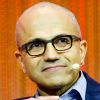15 Best-Selling Future of Technology Books Millions Love
Satya Nadella, Mark Cuban, and Eric Schmidt recommend these best-selling Future of Technology books to understand AI, automation, and innovation impacts.







There's something special about books that both critics and crowds love—especially in the Future of Technology, where rapid innovation shapes our world daily. These 15 titles have won acclaim not just for their ideas but for their proven impact, helping you grasp AI, automation, and emerging tech with clarity and insight.
Leading voices like Satya Nadella, CEO of Microsoft, and Mark Cuban, investor and entrepreneur, have publicly endorsed these works. Nadella highlights how AI 2041 blends storytelling with technical insight, while Cuban praises its practical business applications. Meanwhile, Eric Schmidt, former Google CEO, finds The Kill Chain invaluable for understanding technology's role in national defense.
While these popular books provide proven frameworks, readers seeking content tailored to their specific Future of Technology needs might consider creating a personalized Future of Technology book that combines these validated approaches with your unique goals and background.
Recommended by Satya Nadella
CEO of Microsoft
“By blending imaginative storytelling and technical expertise, Kai-Fu Lee and Chen Qiufan bring to life a vision for AI that addresses both our curiosity and our fears. Read this captivating book to better understand how and when certain technologies are likely to mature, and what that could mean for all of us.” (from Amazon)
by Kai-Fu Lee, Chen Qiufan··You?
by Kai-Fu Lee, Chen Qiufan··You?
When Kai-Fu Lee first realized the scope of artificial intelligence's impact, he teamed up with novelist Chen Qiufan to paint a vivid picture of our near future. Through ten imaginative short stories paired with insightful commentary, you explore how AI technologies like deep learning, robotics, and autonomous systems might reshape daily life by 2041. You’ll gain a nuanced understanding of AI's potential benefits and risks, from economic shifts to ethical dilemmas, grounded in real technological trends. This book suits anyone curious about AI's trajectory, especially those seeking to grasp how these advances could affect society and business in concrete ways.
Recommended by Satya Nadella
CEO of Microsoft
“Iansiti and Lakhani have written an important book that explains what's required to rethink the firm and become an AI-first company. Anyone interested in the impact of AI should read this book.” (from Amazon)
by Marco Iansiti, Karim R. Lakhani··You?
by Marco Iansiti, Karim R. Lakhani··You?
Marco Iansiti, a Harvard Business School professor, teams up with Karim R. Lakhani to explore how AI reshapes business strategy and leadership. You’ll learn why traditional constraints on scale and scope no longer apply when firms harness AI, with vivid examples from companies like Airbnb and Microsoft illustrating these shifts. The book details a new operating architecture driven by data and algorithms, showing you how to rethink your firm’s structure to stay competitive. If you're involved in strategy, leadership, or digital transformation, this book delivers a framework to navigate the AI-driven economy without unnecessary hype.
by TailoredRead AI·
This tailored book explores the evolving landscape of future technologies by integrating battle-tested approaches with your unique challenges and interests. It reveals how emerging tech trends intersect with real-world applications, offering a personalized dive into crucial concepts like AI advancements, automation, and innovation ecosystems. By focusing on your background and goals, the content matches your specific needs, making complex topics accessible and engaging. The book examines how proven methods have impacted diverse industries and how you can apply these insights to navigate the technological future confidently. This personalized guide promises a focused, insightful experience to deepen your understanding of transformative technologies.
by Mustafa Suleyman, Michael Bhaskar··You?
by Mustafa Suleyman, Michael Bhaskar··You?
Mustafa Suleyman leverages his deep experience co-founding DeepMind and leading AI initiatives at Google to explore the seismic shifts that fast-advancing technologies like AI, quantum computing, and synthetic biology will bring to society. You’ll gain an understanding of the complex balance between technological progress and the risks it poses to global governance, privacy, and security, particularly through the lens of what Suleyman calls “the containment problem.” Chapters dissect how governments and institutions might navigate these challenges before it's too late. This book is particularly insightful if you're concerned about the future of AI regulation, ethical dilemmas in tech, or the broader societal impacts of innovation.
Recommended by Lawrence Summers
Harvard University Professor; Former U.S. Treasury Secretary
“Robots, and their like, are on the rise. Their impact will be an important question in the next decade and beyond. Martin Ford has been thinking in this area before most others, so this book deserves very careful consideration.” (from Amazon)
What if everything you knew about employment in the age of automation was wrong? Martin Ford, a seasoned futurist with deep expertise in AI and robotics, challenges the assumption that new technology will always create jobs to replace those it destroys. In this book, you’ll explore detailed analyses of how artificial intelligence and robotics threaten roles from paralegals to programmers, backed by examples like the disruption in healthcare and education sectors. Ford also scrutinizes proposed solutions such as retraining programs and introduces social policy ideas, including guaranteed income, making this a critical read if you want to understand the economic shifts shaping your career and society.
Recommended by Eric Schmidt
Executive Chairman of Alphabet, Former CEO of Google
“Abundance showed us where our world can be in 20 years. BOLD is a roadmap for entrepreneurs to help us get there.” (from Amazon)
by Peter H. Diamandis, Steven Kotler··You?
by Peter H. Diamandis, Steven Kotler··You?
Unlike most technology books that dwell on incremental change, this one dives into how exponential technologies like AI, 3D printing, and synthetic biology are rapidly reshaping industries. The authors, drawing from their experience founding ventures such as Singularity University and XPRIZE, offer insights into the mindset and psychology behind bold entrepreneurship, illustrated through stories of innovators like Elon Musk and Jeff Bezos. You'll also learn practical ways to harness crowd-powered tools and incentive competitions to accelerate growth and impact. This book suits entrepreneurs and innovators ready to leverage cutting-edge tech and scale their ideas globally, though it's less suited for those seeking purely theoretical futurism.
by TailoredRead AI·
by TailoredRead AI·
This tailored book explores the rapidly evolving landscape of future technology, focusing on delivering personalized insights aligned with your background and objectives. It examines key trends and emerging tools that are reshaping industries and daily life, offering a clear path through complex topics. By concentrating on your specific interests, it reveals how advances in AI, automation, quantum computing, and more might impact your personal and professional future. The tailored content ensures you engage deeply with the subjects most relevant to you, empowering you to grasp essential concepts and practical implications within just 30 days.
Recommended by Ray Kurzweil
Computer scientist and technology pioneer
“This brilliant must-read book provides the key to the coming era of abundance replacing eons of scarcity, a powerful antidote to today’s malaise and pessimism.” (from Amazon)
by Peter H. Diamandis, Steven Kotler··You?
by Peter H. Diamandis, Steven Kotler··You?
What if everything you knew about scarcity was wrong? Peter H. Diamandis, a molecular geneticist and aerospace engineer with ties to MIT and Harvard Medical School, teams up with science writer Steven Kotler to argue that exponential technologies are rapidly closing the gap between haves and have-nots. You’ll explore how innovations in energy, healthcare, and education, among others, are reshaping the future, with chapters spotlighting pioneers like Elon Musk and Craig Venter. This book suits anyone curious about how technology and human ingenuity could realistically address global challenges and create abundance, though it may feel overly optimistic if you prefer a more cautious outlook.
by George Gilder·You?
by George Gilder·You?
What if everything you knew about bandwidth and connectivity was outdated? George Gilder, a longtime technology analyst and publisher of the Gilder Technology Report, explores a future transformed by networks with virtually unlimited speed and capacity. He breaks down how this "infinite bandwidth" will upend current technologies and open doors to innovations that radically change data transmission, computing, and communication. You’ll gain insight into the technical and economic forces behind this shift, ideal for anyone curious about how telecommunications infrastructure will evolve and impact industries. While the book delves into complex network theories, it’s accessible enough for tech enthusiasts and professionals eager to understand the trajectory of digital connectivity.
Recommended by K Ken Nakamura
Science and physics aficionado
“I read this great book by @tegmark Highly recommended for all future generation, for everyone should think about AI. Thus in my opinion, since everyone should know about AI, the first half of the book should be required reading in high school.” (from X)
by Max Tegmark··You?
by Max Tegmark··You?
Max Tegmark challenges the conventional wisdom that artificial intelligence is only a distant concern, bringing it into sharp focus with insights drawn from his MIT expertise and leadership at the Future of Life Institute. You’ll explore how AI might transform crime, war, jobs, and society, with chapters dissecting automation’s impact on income and purpose, and the ethical dilemmas of autonomous weapons. This book suits anyone curious about the intersection of technology and humanity, offering you frameworks to navigate debates on superintelligence and consciousness without glossing over their complexities. Tegmark’s approach encourages you to engage critically with AI’s promise and perils in shaping our future.
Recommended by Eric Schmidt
Executive Chairman of Alphabet, Former CEO of Google
“The Kill Chain is a tour-de-force. Few people are as knowledgeable and experienced as Christian Brose in thinking about the intersection of emerging technology and national defense. He pulls it all together in this compelling, unsettling, and outstanding book.” (from Amazon)
by Christian Brose··You?
by Christian Brose··You?
When Christian Brose, a former senior advisor to Senator John McCain and now Chief Strategy Officer at Anduril Industries, wrote The Kill Chain, he aimed to expose how emerging technologies are reshaping military power and threatening America’s defense dominance. You’ll gain insight into the evolving nature of warfare driven by artificial intelligence, autonomous systems, and rapid decision-making networks that together form the "kill chain." Brose examines specific geopolitical threats from China and Russia, offering a clear-eyed analysis of how the US must adapt its military approach and technology integration. This book suits anyone keen on understanding the intersection of technology and national security, especially policy makers and defense strategists.
Recommended by Fareed Zakaria
Author of Ten Lessons for a Post-Pandemic World
“Absolutely masterful.” (from Amazon)
by Henry A Kissinger, Eric Schmidt, Daniel Huttenlocher··You?
by Henry A Kissinger, Eric Schmidt, Daniel Huttenlocher··You?
When Henry Kissinger, Eric Schmidt, and Daniel Huttenlocher teamed up to write this book, they brought decades of political, technological, and academic insight to examine how AI is reshaping society. You’ll explore how artificial intelligence challenges our understanding of knowledge, alters political dynamics, and affects social structures, with reflections on generative AI’s impact on media and jobs. Chapters delve into AI-driven military strategies and ethical dilemmas, offering you a nuanced view of control and governance in this new era. If you’re curious about the intersection of technology and humanity’s future, this book offers thoughtful analysis rather than simplistic predictions.
Recommended by The New York Times
“Kaku spends much of [Quantum Supremacy] recounting the history of computing, bringing listeners back to the Turing machine and the invention of transistors as crucial foundations. That mind-blowing future is the focus. . . . [Kaku's] lucid prose and thought process make abundant sense of this technological turning point.” (from Amazon)
What if everything you thought you knew about computing was about to change? Michio Kaku, a physicist deeply involved with quantum theory, unpacks the emerging power of quantum computers and their potential to reshape industries from medicine to energy. You’ll explore how these machines work at the atomic level and why they’re poised to solve problems classical computers cannot, such as protein folding and climate modeling. Chapters detail the practical impacts on fields like renewable energy and disease research, making it clear this book suits anyone curious about the next wave of technological breakthroughs. While it’s accessible, the material demands your attention to grasp the full scope of this revolution.
Recommended by Bill Gates
Co-Founder & Former CEO of Microsoft
“Ray Kurzweil is the best person I know at predicting the future of artificial intelligence.” (from Amazon)
by Ray Kurzweil··You?
by Ray Kurzweil··You?
Ray Kurzweil's decades-long journey as a pioneering inventor and AI visionary culminates in this detailed exploration of humanity's impending merger with intelligent machines. You’ll gain insight into the exponential growth of technology, from nanobots rebuilding matter atom by atom to radical life extension and brain-cloud interfaces. Kurzweil examines both the optimistic prospects and the complex challenges of AI integration, including impacts on employment and ethical dilemmas. This book suits those deeply curious about how future technologies might reshape human identity and society, especially if you want a data-driven, nuanced perspective grounded in decades of research and keen foresight.
Recommended by Sheryl Sandberg
Former COO of Facebook and LeanIn.Org founder
“In The Fourth Industrial Revolution, Professor Klaus Schwab puts forth a thoughtful framework for leaders to meet the challenge of maximizing the benefits of the profound technological, social and economic transformation reshaping society. Drawing on over four decades of bringing together governments, private sector and other parts of civil society, Schwab starts a wide-ranging discussion on how we can help to ensure that the Fourth Industrial Revolution drives progress for humankind.” (from Amazon)
by Klaus Schwab··You?
by Klaus Schwab··You?
What happens when an economist and engineer with decades leading the World Economic Forum examines technology's rapid evolution? Klaus Schwab presents a framework that goes beyond tech trends to explore how the fusion of digital, biological, and physical worlds will reshape societies, economies, and governments. You’ll gain insight into emerging technologies like AI, 3D printing, and nanomaterials, alongside their ethical and societal implications. This book suits anyone interested in understanding not just the innovations themselves but their profound impact on humanity and how you might influence this transformation.
Recommended by Tony Robbins
Business coach and motivational speaker
“Diamandis and Kotler have written a powerful and beautiful masterpiece outlining a compelling future for humanity. The Future is Faster Than You Think offers CEOs and entrepreneurs a clear vision on the transformation of every major industry this decade. Required reading for anyone who wants to surf above the tsunami of change.” (from Amazon)
by Peter H. Diamandis, Steven Kotler··You?
by Peter H. Diamandis, Steven Kotler··You?
What makes this book different is how Peter Diamandis and Steven Kotler map the collision of multiple accelerating technologies and their collective impact on industries and society. You learn how AI, robotics, VR, and blockchain converge to reshape everything from healthcare to transportation, with chapters illustrating these transformations with clear examples. Diamandis’s background in aerospace and innovation, combined with Kotler’s expertise in peak performance, offers you a lens to anticipate and navigate rapid technological shifts. This book suits entrepreneurs, executives, and anyone curious about the near future’s disruptive forces and opportunities.
Recommended by Robin Sloan
Novelist and olive oil maker
“I got this book because I am lately into 1980s "business book" time capsules , but in fact it is beautifully written and dizzyingly interesting, even in 2019!!” (from X)
by James P. Womack··You?
James P. Womack, drawing from his deep research leadership at MIT and as founder of the Lean Enterprise Institute, developed this book to challenge the prevailing manufacturing norms of the late 20th century. You discover how lean production, a method pioneered by Japanese automakers, fundamentally reshapes manufacturing by integrating every level of a company—from management to suppliers—to improve quality, reduce costs, and respond swiftly to customer demand. The book includes detailed case studies and frameworks explaining lean principles, helping you grasp how this approach disrupted traditional mass production. If you’re involved in manufacturing, operations, or interested in industrial evolution, this book gives you concrete insights into a system that has influenced industries beyond automobiles.
Proven Future Tech, Personalized for You ✨
Get tailored insights on AI, robotics, and innovation without generic advice.
Trusted by hundreds of Future of Technology enthusiasts worldwide
Conclusion
These 15 Future of Technology books present three clear themes: the transformative power of AI, the convergence of rapidly evolving technologies, and the societal impacts of automation and digital innovation. If you prefer proven methods for understanding AI's business and societal role, start with Competing in the Age of AI and AI 2041. For strategic insights on governance and ethical dilemmas, The Coming Wave and Life 3.0 offer invaluable perspectives.
Entrepreneurs and innovators will find Bold and Abundance inspiring roadmaps for leveraging exponential technologies, while technologists fascinated by network and computing revolutions should explore TELECOSM and Quantum Supremacy. Alternatively, you can create a personalized Future of Technology book to combine proven methods with your unique needs.
These widely-adopted approaches have helped many readers succeed in navigating complex technological changes and preparing for the future.
Frequently Asked Questions
I'm overwhelmed by choice – which book should I start with?
Start with AI 2041 for an engaging mix of storytelling and AI insight, praised by Satya Nadella and Mark Cuban. It's accessible and offers a broad view of AI's future impact, perfect for getting your bearings in this fast-evolving field.
Are these books too advanced for someone new to Future of Technology?
Not at all. Titles like The Future Is Faster Than You Think and Abundance provide approachable insights into technology trends without requiring prior expertise, making them great entry points.
Do I really need to read all of these, or can I just pick one?
You can pick based on your interests. For business strategy, try Competing in the Age of AI; for ethical concerns, Life 3.0 is ideal. Each offers distinct perspectives tailored to different facets of future tech.
Are any of these books outdated given how fast Future of Technology changes?
These selections have stood the test of time or offer up-to-date analysis, with recent releases like The Coming Wave addressing cutting-edge AI governance challenges alongside classics like The Machine That Changed the World.
Which book gives the most actionable advice I can use right away?
Competing in the Age of AI provides practical frameworks for reshaping business strategy in an AI-driven world, making it highly actionable for leaders and innovators.
Can personalized books complement these expert recommendations?
Yes! While these expert books offer proven insights, a personalized Future of Technology book can tailor content specifically to your goals and background, combining popular methods with your unique needs. Learn more here.
📚 Love this book list?
Help fellow book lovers discover great books, share this curated list with others!
Related Articles You May Like
Explore more curated book recommendations














